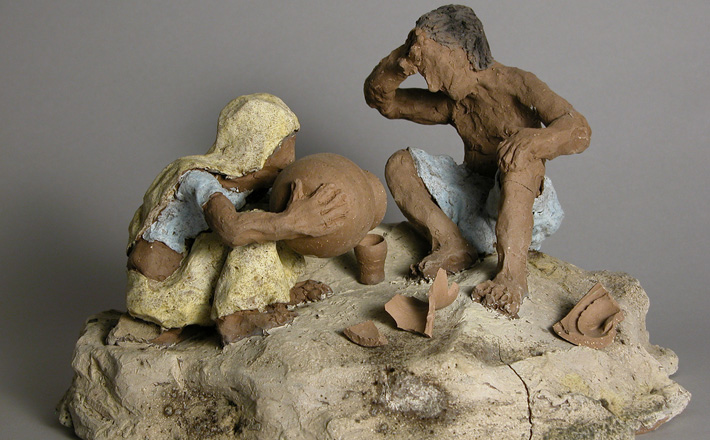Commentary on Exodus 17:1-7
Exodus begins with the Israelites living as slaves in Egypt.
The story says God saw their suffering, and sent Moses to bring them out of Egypt with much fanfare, over the Red Sea, and into the desert.
The desert stories tend to be critical toward the Israelites, emphasizing their disagreeableness and anger, their bitterness toward Moses. Yet high on the list of personal stressors are changing jobs and moving house. So surely, picking up and walking out into a desert with only what they could carry, leaving both home and employment behind, even if it was unhappy employment, wondering where basics would come from, all this must have been extremely stressful.
They had left their tormentors, but they still lived in the real world of hunger, thirst, and uncertainty. As they entered the desert, food became an issue. Water became an issue. These weren’t inconveniences, but serious threats. The travelers may have sounded angry and outraged, but underneath, they must have been afraid.
Most of us, most of the time, take abundant clean water for granted. We don’t comprehend what its lack can bring: fear, disease, and even death. Yet water is too crucial to take for granted.
My daughter is married to a Nepali. I’ve visited them twice in Nepal, getting much more than a tourist view of life in that beautiful, stricken country. It’s not possible to take water for granted there. Even in the relatively modern city of Pokhara, water doesn’t flow freely, but is available for two hours every other day, and residents use electric pumps to draw it to rooftop storage cisterns. Even then it must be filtered or boiled before drinking or food preparation.
During Nepal’s dry winter season, insufficient electricity is generated at the hydro dams, and power can be unavailable fourteen to sixteen hours every day. If electricity is off when the water comes through the pipes, no cisterns are filled. After two weeks in Nepal, I came to realize how dependent I am on systems I take for granted.
Around the world today, and in America, commercial operations are buying up water rights. This means that a basic need, access to clean, free-flowing water, which used to be a gift of the commons, is less and less available. In addition, as glaciers recede, deserts grow, and water is diverted to agriculture and industry, a billion people now lack access to safe drinking water. Many say that the next war will not be fought over oil, but over water.
The carelessness with which a basic necessity is treated came home to me in January 2014, when I took a group of seminary students to Israel and Palestine. Just three days before we left, we heard news of a chemical spill into the Elk River upstream from Charleston, West Virginia, which contaminated the water supply of 300,000 people. This was not in Nepal or Palestine, but in an American capital city.
When we arrived in Bethlehem two weeks later, some of the travelers asked if they could drink the water. Yes, I said. It’s expensive and often scarce in Palestine, but it’s clean and safe. One of the students was from West Virginia. It was deeply ironic to sit in a hotel lobby in Bethlehem, in a city without a country, and hear him say that his family in the U.S. still couldn’t drink water in their own kitchen.
I was slated to lead a retreat in West Virginia almost as soon as I returned from Israel. More than a month after the spill, the water was still no good. “You know that burned pizza feeling in your mouth?” some people told me. “That’s what this chemical is like. It burns the roof of your mouth, your throat, your gums.” Their frustration filled the room.
“What is the chemical?” I asked.
“It’s called 4-methylcyclohexane methanol, or MCHM. It’s used to clean coal. That’s its only purpose. The company that owned the chemicals filed for bankruptcy, so it won’t do anything. The water company gave us instructions to flush out our systems, but that didn’t work.”
“What do you think will happen?” I asked.
“We hope it will cause people to wake up and pay attention. West Virginia is a beautiful state, but our resources are being ruined. And now we’re paying for water we can’t even use.”
That was three years ago, yet the story continues in theme and variation. Especially since the discovery of deadly levels of lead and other chemicals in the drinking water in Flint, Michigan, many other reports have erupted of lead in the drinking water throughout much of the U.S, as well as other toxic industrial and agricultural chemicals. And still water aquifers and wells continue to be threatened and contaminated by new industrial actions, and those who object are often ignored, the right of a few to make money overriding the right to drink water for the many.
In the Exodus story, God cared for thirsty people, giving them water straight out of the rock. A compassionate God met their basic needs even in the wilderness.
We often think of Jesus as coming to save our souls, but over and over the gospel stories show his very practical concern for neighbors’ health and well-being, healing the sick, feeding the multitudes, and honoring the poor and forgotten. To protect such basic necessities is to do what Jesus did, and what God did.
This story of God giving water in the desert invites several responses: first, it invites gratitude, because our creator provides all good things, even down to the fresh water given to this good world, which should never be abused or taken for granted. Second, it invites prayers for the many nearby and around the world who from a variety of causes lack safe drinking water. And third, it invites actions and advocacy to help make water available for everyone God loves.


March 19, 2017